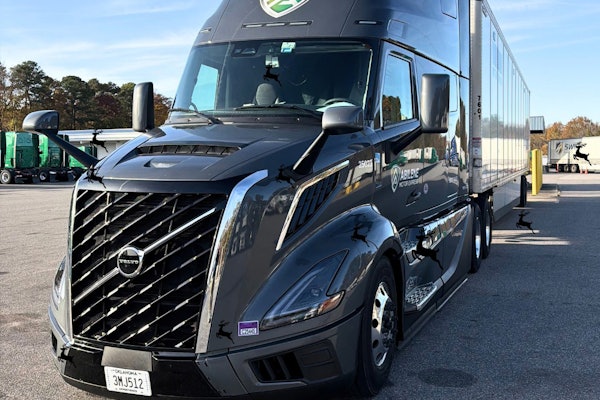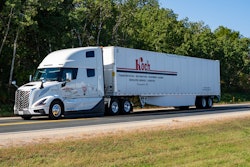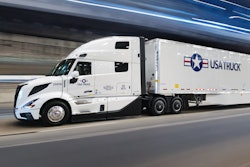For most of the 1990s, John Daniels’ 20-truck refrigerated carrier hovered just below $3 million in revenue. Along with its sister brokerage company Kandel Express, the Akron, Ohio-based Kandel Transport offers clients a mixture of services, including climate-controlled warehousing, brokerage and third-party logistics. But the trucking company was stuck in mid-gear from the time Daniels – then in his early 20s – took over from his father in 1993 until he moved into the company’s new facility in 1998.
Not coincidentally, that was the last year the company failed to break that $3 million barrier. “Throughout the 1990s we could never hit $3 million,” says Daniels. “We’d get 2.95 or 2.97 – always close to 3. In 1998, we didn’t do 3. In 1999, we did 3.1.”
Moving helped because it gave the company access to a large refrigerated warehouse. Kandel leases 80,000 square feet of the facility from another company and rents out space to clients. Perhaps as important, warehousing expands Kandel’s menu of services to existing customers as well as new tenants. Customer service is behind another important step: acquiring trucks and hiring drivers when owner-operators leave.
The plan is working. In 2000, the company almost broke the $4 million mark, and this year, Daniels says the company is on its way to passing $5 million in revenues.
Bedrock of brokerage
Part of Daniel’s success lies in building on Kandel’s long history in brokerage. When Daniels took over in 1993, Kandel Transport was still evolving from a brokerage into a carrier.
Started largely as a one-man vegetable-truck operation in the 1940s, founder Virgil Kandel in the 1970s merged his Kandel Produce Company, based in Hartville, Ohio, with an agent that booked loads for large regulated reefer carriers. The company operated a few trucks under its own authority, but it mostly booked loads for dozens of frozen and fresh food companies.
When deregulation brought about the failure of some established carriers and creation of new and inexperienced ones, Kandel’s brokerage found that it could no longer count on dependable carriers to serve its clients. By then Daniels’ father, Richard, owned Kandel, and the decline in reliable refrigerated fleets forced him more into operating under his own authority and into truck ownership.
“There were a lack of trucks in the refrigerated market,” Daniels says. “All these big, old companies were going out of business. We needed to provide our customers with a more steady flow of equipment than just brokering. We were always a brokerage and a for-hire carrier, but when we started, the trucks that we purchased were a necessary evil.”
Kandel is still hauling for some of the same customers Virgil Kandel did at the start. Except for one client, Kandel’s customers are the same as they were in the 1940s and 1950s, Daniels says. “When we got into hauling, we knew the reefer market pretty well,” he says. “Our fleet may be relatively young, but our customer base goes back to the 1950s.”
Watching the numbers
The fleet’s owner is relatively young as well, of course. By the time his father retired from management in 1993, John, who currently is 30, had been handling billing and other financial and managerial functions for some time. Richard had been focusing on driver and dispatch issues. When his dad first bought the business, John began working after school during high school, and he came on full time when he finished.
Today, Richard drives for his son. At first, Richard began driving to help ease John’s loads when John started having children. “I was doing a lot of driving myself, and it was kind of crazy,” Daniels says. “It turned into a full-time thing for him. He enjoys doing it.”
One of Daniels’ early actions was to bring in an old high school friend, who was an accountant, into the business. The hiring of an accountant was an integral part of Kandel’s current success, Daniels says. Among other things, having a financial person in the company helps the company focus on the bottom line.
One thing Kandel’s managers watch closely is the relationship between its brokering and trucking operations. “I don’t think you can go for very long with a brokerage percentage above 60 percent,” he says. “I don’t think you can provide long-term, good service for your customers brokering more than 60 percent.”
Cost per mile is another important benchmark for Kandel. Daniels also has learned to cut costs through a more effective equipment strategy. At first, using company trucks instead of owner-operators wasn’t very profitable because the company bought old trucks and “maintenance costs ate us alive.” Those expenses were in excess of 20 cents a mile per unit, and the company was getting everything, down to the oil change, done at dealerships. A short-term solution, truck rental, proved to be expensive as well.
By 1998, Kandel had turned to leasing, which allowed him to drive maintenance costs down to 7 cents a mile. “We couldn’t have done it, if it weren’t for leasing,” he says. “If we had jumped into it with heavy truck ownership right away, we would have failed.” Daniels now is in the financial position to purchase new equipment. He also has turned to performing his own maintenance which helps keep costs down.
Better at the docks
When Kandel began moving more toward motor carriage after deregulation, it tried relying solely on owner-operators. But that approach just wasn’t getting the job done for customers, Daniels says. Conditions for drivers at the docks are tough, and many owner-operators refuse to put up with it, he says.
“The drivers get talked to like dogs,” Daniels notes. “The lumper situation on docks is bad. Some receivers try to dupe you out of money. Basically, they want to make it as miserable a place as they can for the drivers on the receiver end. There are a lot of guys who can’t deal with that.”
So when Daniels finds owner-operators who can deal with it, he works to keep them happy – even at the expense of lower utilization for company equipment. “He leaves his trucks sitting to give freight to me,” says 72-year-old trucker Dale Tombs.
But for Daniels, owner-operators like Tombs are rare. So to ensure customer service, Kandel counts on replacing owner-operators who leave with company trucks. Today, the fleet is almost evenly split between owner-operators and company drivers, but he sees it getting harder to get owner-operators to perform the same customer service functions he can train a company driver to do.
“With the owner-operator market being unwilling or unable to provide a high enough level of service, we got into renting, then leasing, then owning trucks to have our own control,” he says. “With an owner-operator fleet you can’t provide the level of service you can with a company-driver fleet in the refrigerated market. There may be other markets, like dry van, where that’s not a problem. But in the position we were in, we felt we needed some company trucks to take care of our customers.”
Branching out
A balance of brokerage and transportation helps Kandel ensure strong customer service, and the move into warehousing both enhanced Kandel’s service options and fueled the company’s revenue growth. Warehousing brings in nearly $2 million a year, Daniels says. “I wanted to get away from the low profits of trucking and into something else.”
For Kandel, warehousing isn’t just an additional stream of revenue; it’s another way to serve customers better. Daniels says adding warehousing capacity to the business grew out of his customers frustration with existing storage providers.
“It isn’t necessarily that the square-footage of cold storage here in Akron is low,” Daniels says. “It’s just not top notch service. We were dealing with these warehouses all the time. We knew they were having problems. We knew about the service. We capitalized on that. Since Kandel was picking up and delivering refrigerated goods for clients to other warehouses in the region, the company was aware of the service problems.”
Without a single commitment, Daniels says his company moved in 1998 to a new facility where the company could lease refrigerated warehousing and help its clients. Four months later, the warehouse was full, and Kandel expanded the warehouse to include an ice cream section. Getting into warehousing was a gamble that paid off. What was started as a customer service move, quickly became a major part of the company’s revenue stream.
In fact, one of Kandel’s trucking clients, Dean Foods, started off leasing space in Kandel’s warehouse. Now it’s the company’s second largest freight client. “We didn’t do any trucking with them before the warehousing,” Daniels says. “Now they’re number two. … We even work on their trucks.”
“We’re the Cadillac of trucking,” he says. “We’re small, but we do it right the first time. If we make a mistake, we take the blame and correct it.”
Trucking remains the lion’s share of his business, but the higher-margin warehousing helps buoy the transportation side of the company. But even the transportation portion of the business has remained fairly strong because the refrigerated market is more than holding its own, Daniels says. The frozen food business continues to grow.
Daniels remains committed to transportation and plans to continue growing the fleet – as long as it can serve Kandel’s customer needs to do so. History has been a good teacher. “Trucking is definitely in my blood,” he says. “It’s always been in my blood. When I sit down at a family reunion, there’s one thing that’s talked about among the men. That’s trucking. Has been since I was a little kid.”









